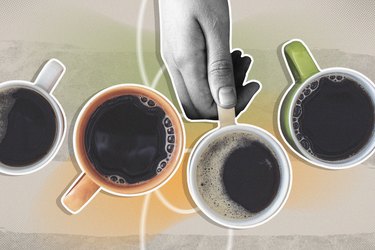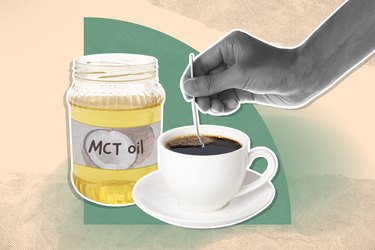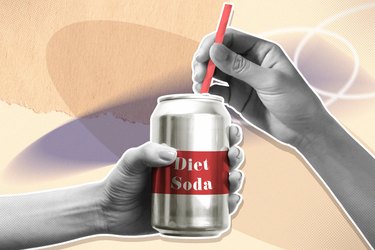
If you depend on a jolt of java to jumpstart your day, you're in good company. The average American drinks more than 3 cups of coffee per day, according to the National Coffee Association (NCA). That's a lot of joe.
Here, dietitians explain if it's bad to drink coffee every day, and how coffee affects your whole health.
Video of the Day
Video of the Day
1. Your Brain Health Is Supported
Shortly after drinking coffee (or any caffeine) you'll feel a jolt of alertness. In moderate quantities, coffee can help you focus and stave off feelings of sleepiness, according to a December 2015 report in Practical Neurology.
"Caffeine binds to receptors in the brain to block tiredness," says Lisa Moskovitz, RDN, founder and CEO of the NY Nutrition Group and author of The Core 3 Healthy Eating Plan.
It can also support cognitive function and memory: In a June 2017 meta-analysis in Clinical Nutrition, drinking 1 to 2 cups of coffee daily was associated with lower rates of Alzheimer's, dementia and other cognitive decline and impairment.
Your mood may even get a protective boost: An October 2015 study in Molecular Nutrition and Food Research linked 1 to 2 cups of coffee a day to a lower risk of depression compared to people who drank more or less coffee daily.
The way caffeine interacts with brain chemicals likely plays a pivotal part, but it's not just caffeine at work, as some of these results didn't hold true with tea. More research is needed to fully understand the way caffeine in general and coffee in particular works in the brain.
2. Your Heart May Get Some Protection
When consumed in moderation — meaning a maximum of four cups a day for most healthy folks — your coffee may come with a constellation of cardio-protective perks.
For example, drinking at least 1 cup of caffeinated coffee a day is linked to a lower incidence of heart failure, per a February 2021 Circulation: Heart Failure study. And drinking a moderate amount — 2 to 3 cups a day — is associated with lower rates of heart disease, arrhythmia, high blood pressure and dying from any cause, according to an October 2022 report in Trends in Cardiovascular Medicine.
Perhaps that's in part because your cup of joe possesses powerful polyphenols. These potent plant-based compounds act as antioxidants and help decrease cell damage, according to Harvard Health Publishing.
Not to mention, coffee beans are rich in magnesium, potassium and niacin, which are all necessary for a healthy heart. These elements support healthy blood sugar levels, metabolic rate and blood vessel function, per Harvard Health Publishing.
However, the kind of coffee you drink may make a difference. For example, some studies have demonstrated unfiltered varieties may not protect heart health.
For example, in one April 2020 study in the European Journal of Preventive Cardiology, adults over 60 who drank unfiltered coffee had a higher risk of dying from heart disease or stroke than their peers who drank filtered coffee or no coffee.
3. Your Cholesterol Levels May Rise
Because coffee doesn't contain any cholesterol, you might think it doesn't have an effect on your cholesterol levels as long as you go easy on the creamer. But that's not totally true.
"While the research primarily resides in small studies, we are seeing that the fat in coffee beans, particularly in cafestol and kahweol [compounds in the oils of coffee], can contribute to the rise in cholesterol, particularly LDL or 'bad' cholesterol," says Kylene Bogden, RDN, co-founder of FWDfuel.
Known as diterpenes, these oily substances in coffee "can stifle your body's natural ability to process and remove cholesterol," she says.
But the dose of diterpenes largely depends on how much coffee you have — and how you brew it. Studies, including preliminary 2018 research highlighted in Heart, have primarily found a link with higher cholesterol in people who drink 4 or more servings of coffee a day.
And diterpenes are more plentiful in unfiltered coffees like French press versus filtered varieties. "When the coffee passes through a paper filter, the oils are blocked from reaching your mug," Bogden says.
In fact, one cup of filtered brew boasts 30 times fewer diterpenes than the same amount of unfiltered java, according to Harvard Health Publishing.
So, if you have a history of high cholesterol or heart issues, it might be beneficial to forego unfiltered coffee varieties or at least limit how much you drink them.
4. Your Blood Pressure Might Increase
Caffeine narrows your blood vessels, so "it can raise blood pressure within the first 30 minutes post-consumption," Bogden says.
While it's not fully understood why this happens, one hypothesis posits that caffeine blocks a hormone that widens your arteries, Moskovitz says.
Another theory is that the stimulant boosts adrenaline, which increases pressure in your arteries, she says.
Whatever the physiological mechanism, caffeine only seems to have a temporary effect on blood pressure. "This [increase] tends to level off after approximately 3 to 4 hours," Bogden says.
Plus, this effect seems to be less prevalent in people who have coffee frequently. "If you're a regular coffee drinker, you may build a tolerance to the blood pressure-rising effect of caffeine," Moskovitz says.
Still, "there are many others, particularly those who are chronically stressed, who experience the opposite effect," Bogden says. This is because caffeine can trigger the release of more stress hormones.
Indeed, caffeine can activate "the adrenal glands to produce more adrenaline, thus increasing heart rate and constricting blood vessels," Bogden says.
5. Your Sleep Could Suffer
In small amounts, the caffeine in coffee can help you fend off fatigue (that's probably one of the reasons you drink it!).
But a surplus of the stimulant (more than 4 caffeinated cups a day) can also cause nervousness, heart palpitations, the jitters and insomnia, according to the Mayo Clinic.
"Sleep can most definitely suffer from caffeine intake, even when consumed early in the morning," Bogden says. There are two major reasons for this.
The first relates to genetics, which determines your ability to effectively metabolize caffeine, she says. Some people are especially sensitive to the stimulant, even in small quantities, which can trigger unwanted side effects like restlessness and difficulty sleeping, per the Mayo Clinic.
The second is your age. "Our ability to detoxify as we age becomes less efficient, and this also plays a role [in caffeine's effect on sleep]," Bogden says.
But this sleep-sabotaging effect can have serious long-term consequences. If your coffee habit is hindering your sleep quality every day, over time, it may even increase your chances of developing chronic health problems like heart disease, according to the Centers for Disease Control and Prevetion. Harvard Health Publishing.
Tip
Coffee has a half-life of up to 5 hours, according to the American Academy of Sleep Medicine. In other words, it can take up to 5 hours for your body to flush out half of the drug. So if a cup is compromising your sleep, a safe plan is to axe your afternoon coffee and have your last mug about 10 hours before bedtime.
6. You May Experience Caffeine Dependence
"Developing a dependence on coffee is very common," Moskovitz says. This is usually what people mean when they talk about being "immune" to their morning brew.
Caffeine is similar to any other drug including nicotine or alcohol, Bogden says. The more you take in, the more your body can tolerate — and the more you need to achieve the desired effects.
"One of the reasons caffeine is so enticing is because of how it makes us feel: productive, energetic, alert and motivated," Moskovitz says.
But these benefits are a result of the way caffeine changes our brain chemistry. Caffeine can block adenosine, a neurotransmitter in our brain that promotes sleep and relaxation, Moskovitz says. That's why it can ward off feelings of fatigue and tiredness.
"However, over time, your body can start to overproduce adenosine [to compensate] and the caffeine fix you grew reliant on can become harder and harder to achieve," Moskovitz says. "You might notice that one cup doesn't do it anymore, and you need two or three to feel functional."
"Further, caffeine withdrawal can be felt more profoundly and become very unpleasant, which just reinforces the need for more coffee to function properly," she adds.
Whether or not you develop a dependence or how severe that dependence gets often relates to your genetics, Bogden says. Other factors such as age, lifestyle habits, activity levels, general health and body mass may play a role, Moskovitz adds.
If you're uncomfortable leaning on caffeine, you can decrease your dependence. "You can lower your immunity, or tolerance, by slowing weaning off of coffee," she says.
7. Your Workouts May Get a Boost
"Since coffee is a natural energy booster, it's no surprise that drinking a cup before a workout can improve strength and performance," Moskovitz says.
"If the right amount is consumed approximately 30 to 60 minutes before training, caffeine can increase blood flow and lower the perceived rate of exertion," Bogden adds.
And the science backs them up. A March 2019 review in the British Journal of Sports Medicine found caffeine intake enhanced endurance, strength and power during exercise.
"However, regular coffee consumers should note that the exercise-enhancing effects can be diminished if you're drinking a few cups per day," Moskovitz says.
Again, it boils down to your body building up a tolerance. Remember, the more java you sip on a regular basis, the more it'll take to achieve the same results. And this holds true when we're talking about workout performance as well.
Put another way, "you may not see the same energy-boosting benefits as someone who only drinks coffee around their workouts," Moskovitz says.
8. Your Risk of Chronic Disease May Decrease
Your love of coffee is linked to longevity and a lower likelihood of chronic health conditions.
Here's why: "Coffee beans are a significant source of disease-fighting antioxidants," Moskovitz says.
Moderate coffee intake — between 2 and 5 cups per day — has been associated with a decreased risk of type 2 diabetes, Parkinson's disease, depression and early death, according to the Harvard T.H. Chan School of Public Health.
Still, there's a significant number of additional factors that play into this equation, such as genetics and lifestyle habits, Bogden says.
For example, some of coffee's long-term health benefits may be moot if you stir too much sugar into your cup. "While a few tablespoons of creamer and a few teaspoons of sugar are harmless, if you're having several servings of each per day, it can add up over time," Moskovitz says.
In the long run, excessive sugar intake can contribute to higher blood pressure, inflammation, weight gain, diabetes and fatty liver disease, which are all correlated to a greater chance of heart attack and stroke, per Harvard Health Publishing.
9. Your Eating Habits Might Change
Coffee can also have an effect on hunger. In fact, sipping on some joe can suppress appetite, Moskovitz says.
But this may depend on the kind you drink. A small June 2012 study in the Journal of the American College of Nutrition found decaf may decrease hunger and increase certain hormones that make you feel full.
While appetite control might sound appealing to those with weight-loss goals, these hunger-hindering effects can ultimately have the opposite result.
Here's why: If you eat less throughout the day, you deprive your body of fuel when it needs it most. "Once that caffeine wears off, you might find yourself more ravenous than ever as your body tries to catch up on your nutritional requirements," Moskovitz says.
This in turn might lead to nighttime cravings, late-night snacking or binge eating.
- Harvard Health Publishing: “What’s the healthiest way to brew coffee?”
- Circulation: Heart Failure: “Association Between Coffee Intake and Incident Heart Failure Risk”
- Harvard Health Publishing: “Pressed coffee is going mainstream — but should you drink it?”
- The World Journal of Biological Psychiatry: “Coffee, caffeine, and risk of completed suicide: results from 3 prospective cohorts of American adults”
- The Harvard Gazette: “Researchers link caffeine’s impact on brain chemicals as playing key role”
- Nature: “Post-study caffeine administration enhances memory consolidation in humans”
- Harvard T.H. Chan School of Public Health: “Is coffee good or bad for your health?”
- Harvard Health Publishing: “The sweet danger of sugar”
- Cleveland Clinic: “Why Does Coffee Bother My Stomach?”
- Nutrients: “Long-Term Coffee Consumption is Associated with Fecal Microbial Composition in Humans”
- Mayo Clinic: “Caffeine: How much is too much?”
- British Journal of Sports Medicine: “Wake up and smell the coffee: caffeine supplementation and exercise performance-an umbrella review of 21 published meta-analyses”
- Journal of the American College of Nutrition: “Coffee, hunger, and peptide YY”
- Heart: "High intake of coffee positively correlated with total and LDL cholesterol in healthy young adults"
- Trends in Cardiovascular Medicine: "Coffee and tea on cardiovascular disease (CVD) prevention"
- European Journal of Preventive Cardiology: "Coffee consumption and mortality from cardiovascular diseases and total mortality: Does the brewing method matter?"
- Practical Neurology: "Effects of coffee/caffeine on brain health and disease: What should I tell my patients?"
- Clinical Nutrition: "Coffee intake and the incident risk of cognitive disorders: A dose–response meta-analysis of nine prospective cohort studies"
- Molecular Nutrition and Food Research: "Coffee, tea, caffeine and risk of depression: A systematic review and dose–response meta-analysis of observational studies"
- CDC: "Sleep and Chronic Disease"



